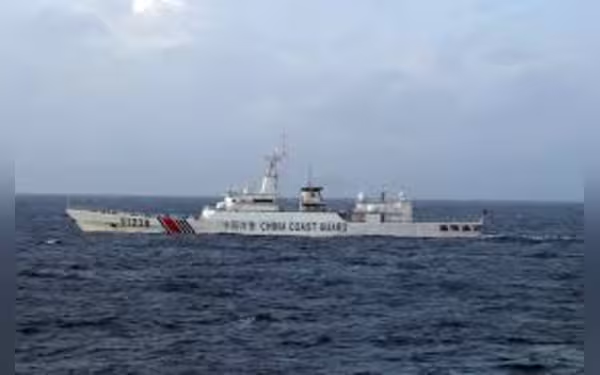Friday, October 18, 2024 03:32 AM
China Expels Japanese Fishing Vessel from Disputed Islands
- China's coast guard expels Japanese fishing vessel.
- Tensions rise over Diaoyu/Senkaku islands dispute.
- Japan monitors Chinese vessels near disputed waters.
 Image Credits: thefrontierpost
Image Credits: thefrontierpostChina's coast guard expels a Japanese fishing vessel, escalating tensions over disputed Diaoyu/Senkaku islands in the East China Sea.
In recent developments, tensions between China and Japan have escalated over a series of disputed islands in the East China Sea. These uninhabited islands, known as the Diaoyu in China and the Senkaku in Japan, have long been a point of contention between the two nations. While China claims sovereignty over these islands, Japan administers them, leading to frequent confrontations and diplomatic disputes.
On Thursday, China’s coast guard announced that it had "expelled" a Japanese fishing vessel that had entered the waters surrounding these disputed islands. According to Liu Dejun, a spokesperson for the coast guard, the Japanese ship was said to have "illegally entered territorial waters" from Tuesday to Wednesday. The coast guard took what it described as "necessary control measures in accordance with the law," which included issuing warnings and ultimately expelling the vessel.
Liu emphasized that "the Diaoyu and affiliated islands are China’s inherent territory," urging Japan to cease all activities deemed illegal in these waters. He further stated that Chinese coast guard ships would continue to conduct maritime rights protection and law enforcement activities to safeguard national sovereignty and maritime interests.
In response, Japan’s coast guard reported that its patrol ships were actively monitoring four Chinese coast guard vessels near the islands. They noted that a Japanese fishing boat was operating approximately 10 kilometers west of the largest island in the group. This ongoing situation highlights the delicate balance of power and the complex relationship between the two nations.
China has made several claims this year regarding the expulsion of Japanese vessels from the area. However, Japanese officials have expressed skepticism, suggesting that Chinese authorities sometimes announce expulsions even when no such actions have taken place. This raises questions about the accuracy of the claims and the motivations behind them.
Moreover, the broader context of this dispute cannot be overlooked. China has been increasingly assertive in its territorial claims in both the East and South China Seas, reigniting long-standing disputes with other nations, including the Philippines. Additionally, military drills around Taiwan have further strained relations in the region, as China continues to assert its claims over the self-ruled island.
Despite being major trade partners, the relationship between China and Japan is fraught with historical tensions and geopolitical complexities. Japan's alliances with Western nations and its imperial past add layers to this already intricate dynamic. Recent events, such as Japan's protests against China's missile tests in the Pacific and Beijing's ban on Japanese seafood imports, illustrate the fragile nature of their interactions.
As the situation unfolds, it is crucial for both nations to engage in dialogue and seek peaceful resolutions to their disputes. The ongoing tensions not only affect bilateral relations but also have broader implications for regional stability in East Asia. Understanding the historical context and the current geopolitical landscape is essential for grasping the significance of these developments. Ultimately, fostering cooperation and mutual respect may pave the way for a more stable and peaceful future in the region.













